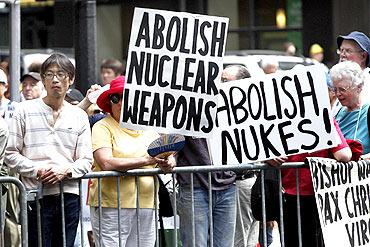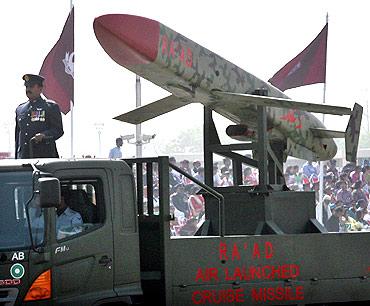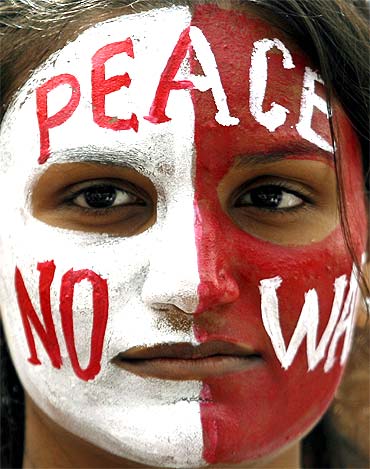Photographs: Chip East / Reuters Priyanka in New Delhi
Urging India, China, and Pakistan for a universal nuclear disarmament agreement, Congress leader and former Union minister Mani Shankar Aiyar said that many countries were realising how useless the weapons are; they are extremely expensive, they are dangerous and probably will never be used. Priyanka reports
Congress leader and for Union minister Mani Shankar Aiyar, who is heading an informal group on universal nuclear disarmament and had recently presented its report to the prime minister, said on Friday there is hope of achieving a universal nuclear disarmament agreement between India and its neighbours -- Pakistan and China -- if the issue is constantly pushed on the agenda of talks between the three nations.
"Off the government workings and purely on the intellectual track, I can tell that I am in discussion with some experts from China and some experts from Pakistan to hold a tri-logue between India, Pakistan and China on universal nuclear disarmament," Aiyar said.
Prime Minister Manmohan Singh had set up an informal group in August 2011, to explore 'nuclear weapons free and non-violent world order' which the then prime minister, Rajiv Gandhi, had first spoken about in the third session on disarmament at the United Nations General Assembly in June 1988.
'There are indications that nations want to move towards nuclear disarmament'
Image: Pakistan's nuclear-capable air-launched Ra'ad cruise missileThe informal group comprising of Ambassador Satish Chandra, Ambassador Saurabh Kumar, Professor Amitabh Mattoo, Admiral (retd) L Ramdas, Dr Manpreet Sethi among others, submitted its reports with a roadmap and recommendations for nuclear disarmament recently. The group claims to have received a positive response from the ministry of external affairs.
The report argues that there are many general and about 19 specific reasons that can make universal nuclear disarmament possible and achievable today than it was any time earlier. Aiyar cited that after a change in the position of the United States and US President Barack Obama on the nuclear posture review, and the stances taken by North Atlantic Treaty Organisation, there are indications that the world nations want to move towards nuclear disarmament.
Aiyar noted, "In our report, we are not talking about unilateral disarmament but universal disarmament of nuclear weapons, which can only happen after India takes a lead in promoting Rajiv Gandhi's action plan and places it on the agenda of bilateral talks with not only Pakistan but also other nuclear powers."
He also said, "China's policy of no first use should be like the sound of music to our ears when compared to any other nuclear power, as it is the cornerstone of our own nuclear doctrine as well."
...
'Nations now realise the futility of possessing nuclear power'
Image: A student with a peace message painted on her face attends an anti-nuclear demonstration rallyPhotographs: Punit Paranjpe/Reuters
Aiyar argued that there have been definitive indications in the recent years and nuclear powers worldwide have come to understand the futility of possessing nuclear power. "Many countries are today probably finding how useless the weapons are; they are extremely expensive, they are dangerous and they probably will never be used," Aiyar said.
He also said that nuclear powers such as Britain, France, China and Pakistan and India are at least willing to think about a world without nuclear weapons. "The British have been more upfront with this regard and there is an indication that they would like to move towards nuclear disarmament if they can," he added. "France has also made voices which indicate a certain willingness to at least consider nuclear disarmament."
Among the India-specific reasons on why universal nuclear disarmament is more favourable today than it ever was, Aiyar said, "The fact that we are an SNW (state with nuclear weapons) would make us the first armed state with nuclear weapons to argue the case for their time-bound elimination. He also argued that as a nation, the threat of nuclear weapons is much real to India.
"Whether by nuclear attack or terrorism, the best security for India lies in universal nuclear disarmament," Aiyar said.
...
'Nuclear weapon powers can talk nuclear sense'
Image: man walks past a vehicle decorated with an image of a nuclear-capable Shaheen missile in RawalpindiPhotographs: Goran Tomasevic/Reuters
Aiyar said, "India, Pakistan and China, all nuclear powers, can show a way to the world and show that nuclear weapon powers can talk nuclear weapon sense. Maybe we can teach nuclear sense to others as well, even though they might be aware of the threats of being a nuclear weapon power."
The report also details a roadmap -- a list of recommendations about working on nuclear disarmament. To begin with, it says, India should consider taking a lead and commit to eliminating its arsenal of nuclear weapons 'as a part of a universal, non-discriminatory and verifiable global process of disarmament'.
"There already is an official dialogue for confidence building measures between these countries, a dialogue is going on, but we would like to have some discussions trilaterally and jointly consider how to undertake a plan towards global elimination of nuclear weapons in the way we have mentioned in this report; something that would be universal, time bound and has to be viable," he added.
However, during the course of the discussion, Aiyar agreed that were many points of disagreements and conflicting statements by the nuclear powers on disarmament. "But there are many hurdles," Aiyar explained, "Like for instance the US, which has shown its commitment to nuclear disarmament, but is equally committed to not letting the count of their nuclear arsenal fall below 1,000 warheads. Similarly, the Russian federation has openly said it will not take down its arsenal to less than 1,000 warheads. Hence, we are in a world where the two principles do talk about nuclear disarmament but are unwillingly to reduce nuclear warheads beyond a certain number."
He also agreed to the conflict of interests between India and Pakistan over FMCT (Fissile Material Cut-off Treaty). "I know there is a disagreement between India and Pakistan over FMCT," he said. "But despite our differences with Pakistan, I feel there is scope with the Pakistan, if we can talk about it at least in the intellectual circles if not in government circles."





article